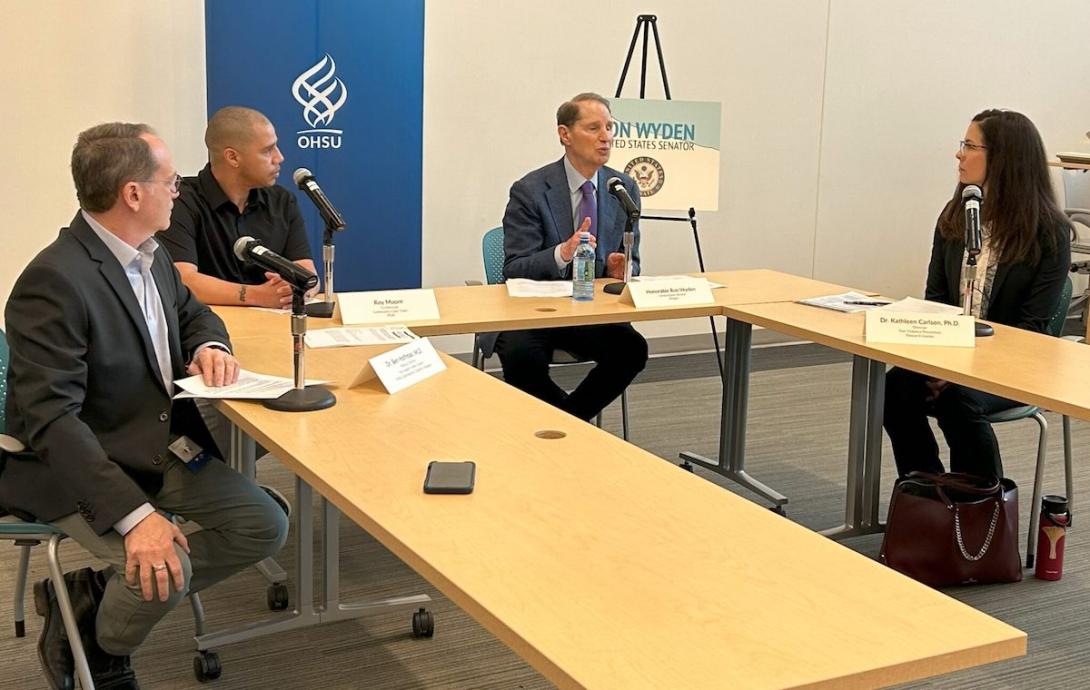
U.S. Sen. Ron Wyden plans to pursue federal legislation to reduce the surge in gun violence.
Oregon’s senior senator discussed the problem on Friday with experts at Oregon Health & Science University’s South Waterfront campus in Portland. The meeting included experts involved with a federally funded OHSU and Portland State University research project studying strategies to blunt gun violence.
Kathleen Carlson, the initiative’s chair, is one of the top gun violence researchers in the country, according to Wyden. Dr. Ben Hoffman, medical director of Doernbecher Children’s Hospital, was also at the meeting along with Roy Moore, a gun violence survivor. Moore helps lead a Portland-based program, Healing Hurt People, that steers victims away from a cycle of violence.
They called for more research on strategies to reduce gun violence and laws to curb the “scourge” of violence in Oregon. Shootings and teen suicide rates by gun have surged in the state, Hoffman said. He’s “haunted” by the deaths of his patients, including an 11-year-old child who accessed an unlocked firearm and committed suicide.
Emergency room visits for firearm injuries spiked 33% statewide from 2018 to 2022, according to the joint initiative. Portland clocked 268 shooting incidents in the first three months of 2023, a 163% increase from the same period in 2019, the most recent Portland Police Department data available.
Nationally, gun violence is now the leading cause of death for children and teens, Hoffman said.
Wyden vowed to pursue four measures in Congress to curb gun violence nationally: laws mandating the safe storage of firearms, expanded background checks on gun purchasers, more funding for behavioral health care — a hot topic in Oregon, which ranks low nationally in access to care — and a federal extreme risk protection order law. Also known as red flag laws, the laws empower judges to temporarily seize firearms from people deemed to be a risk to themselves or others.
Wyden pledged to build on the Bipartisan Safer Communities Act of 2022, the most significant gun safety legislation passed in more than 30 years. Part of that bill devoted $750 million in funding for states to establish red flag laws.
Oregon was one of 20 states that passed red flag laws as of mid-March, the Bend Bulletin reported. Oregon lawmakers also passed in 2021 a bill requiring gun owners to safely store a firearm in a gun room or safe, or use a trigger lock when it’s not in use.
Gun-control bills in the state Legislature that are supported by Democrats are among the most divisive this session and are part of the reason Republicans have shut the state Senate down by staging a boycott.
Wyden acknowledged that certain gun regulations remain vehemently opposed by congressional Republicans.
“It’s not going to be a snap of the fingers and you get all four of those things done,” Wyden said.
But he and the experts said supporters could make progress with behind-the-scenes measures that don’t involve new gun laws.
Hoffman said health care facilities should distribute gun lockboxes to families in crisis. He said safe gun storage prevents children and adults alike from impulsive suicide attempts, which are far more deadly with firearms than other methods. In Oregon, more than 80% of gun deaths are suicides, the researchers say, with especially high rates for rural Oregonians and teens.
Hoffman said most of his work involves teens with behavioral health problems. He said he can screen these patients for depression or suicidal thoughts but “cannot get them into long-term therapy to address the underlying problems.”
Oregon officials have moved to ramp up behavioral health care. In March, Oregon Gov. Tina Kotek asked the Legislature for $74.2 million as she crafts a five-year plan to address the crisis.
Suicide is personal for Carlson, an associate professor at the OHSU-PSU School of Public Health. She said she was raised in rural Venetia in a home with firearms and lost her grandfather to a suicide with a gun.
Carlson’s team was the first in the U.S. to receive a federal grant studying gun violence when the administration of Democratic President Barack Obama lifted a ban on funding such research in 2013.
Carlson provides data and guidance to Moore, who meets with shooting victims and their families in Portland-area hospitals as victims heal. His organization, Healing Hurt People, deploys people who have survived violence and prevent retaliations.
It’s intense work; Moore said he recently hired an in-house therapist for his own staff.
But he said the work is yielding good results. His organization served almost 140 victims and their families last year and none were later involved in gun violence, he said. Just one was rearrested for a violent crime.
Wyden applauded Moore’s work and said it could reduce gun violence nationally.